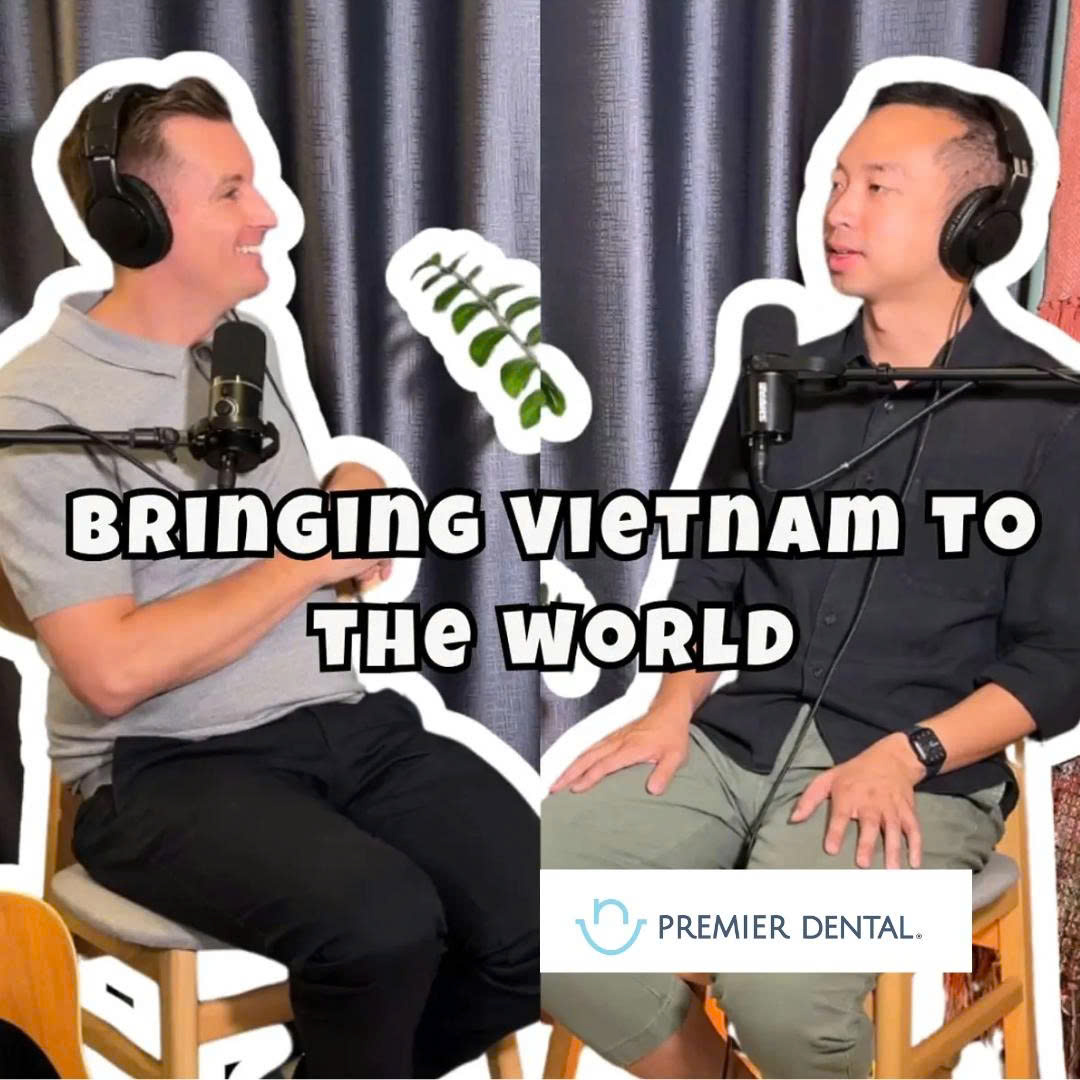My name is Niall Mackay, The Podcast Guy, and the host of A Vietnam Podcast. When I first started this show, it was all about getting to know the people around me in Saigon—hearing their stories, understanding what brought them here, and learning more about this country I now call home.
I invited Hao Tran, CEO and co-founder of Vietcetera, one of Vietnam’s most influential media companies. Hao’s story is one of risk, resilience, and reinvention. From arriving in Vietnam at 23 with no plan, to leading a content empire that reaches millions, Hao offered insights that went far beyond the typical founder narrative.
Hao Tran’s Unconventional Path to Vietcetera
When I spoke with Hao Tran, CEO of Vietcetera, I was struck not just by the story of how Vietcetera came to life, but by how much of it was shaped by uncertainty, risk, and pure instinct.
Hao Tran shared his rather unexpected journey that ultimately led him to establish Vietcetera.
Hao arrived in Vietnam at just 23 years old. He had just been laid off from his tech job in San Francisco. No backup plan. No job offers. No connections in Vietnam. What he did have, though, was something most founders don’t talk about enough: curiosity.
The First Interview Blog
He came to Vietnam with the mindset of exploration, not execution. There was no roadmap, no business model, and certainly no pitch deck. Instead, he started simply with blogging. His first piece? An interview with the founders of Marou Chocolate. At the time, Marou had just opened their first retail shop, and Hao approached them with zero portfolio and a lot of humility. To his surprise, they agreed. The resulting article didn’t hit the mark at first, but after some constructive feedback and a total rewrite, he got his first real “yes.”
That moment was pivotal. Not because the article went viral—it didn’t. But it sparked a series of connections and momentum that slowly snowballed into something bigger.
Of course, the early days weren’t glamorous. Hao told me he lived on 6.5 million VND per month—about $300 USD. That’s barely enough to survive in Ho Chi Minh City, let alone bootstrap a startup. Yet somehow, it worked. He kept writing. He kept meeting people. He kept pushing.
What stood out to me wasn’t just the hustle. It was Hao’s willingness to build something with no promise of success, just a belief that Vietnam had stories worth telling. That belief became the foundation of Vietcetera. And in many ways, it reminded me of how this podcast began, too.
Bringing Vietnam to the World: Vietcetera’s Mission in Action
What started as a simple blog with no clear direction eventually evolved into one of Vietnam’s most influential media companies. As Hao and I spoke, it became clear that Vietcetera didn’t just grow—it grew with purpose.
From the very beginning, Hao’s mission was to bring Vietnam to the world. But not in the way we often see Vietnam portrayed in travel blogs or international headlines. It was about capturing the stories that most of the world never hears—those of entrepreneurs, creatives, innovators, and the emerging generation shaping modern Vietnam.
That mission resonated with me deeply. In many ways, it mirrored my own shift with this podcast—from casual conversations in Saigon to sharing voices from across the country and the diaspora.
Vietcetera now runs over nine podcasts, mostly in Vietnamese, with standout shows like Have A Sip and Vietnam Innovators becoming household names for Vietnam’s white-collar audience. Their content reaches a young, urban demographic—people hungry for thoughtful, progressive conversations in a market that’s often dominated by surface-level trends.
Vision and Stability
What I found particularly insightful was Hao’s admission that there were initial doubts about whether they would eventually run out of stories. Yet, the reality, as he explained, was quite the opposite. The sheer pace of Vietnam’s growth and development provided an “overflowing” number of narratives. This really highlighted how rapidly the country is evolving and how many exciting developments are happening beneath the surface, waiting to be shared.
What impressed me most was the sustainability of it all. Hao and his team didn’t just ride a wave of popularity—they built a structure to support it. Vietcetera is now financially viable. It’s a company with real impact and real staying power. And they did it while staying true to their core mission.
Gen Z, Hierarchies, and the Realities of the Modern Vietnamese Workplace
Gen Z is an interesting topic that many businessmen and entrepreneurs have mentioned in my podcasts. They are the generation that is dynamic, confident, and eager to learn and express themselves.
What struck me was how self-aware Hao is about this dynamic. Instead of blaming “kids these days,” he recognizes that mindset is the key, not just hard skills. His team is full of talented, bilingual professionals. But mindset—how people take initiative, handle discomfort, and navigate collaboration—has become the bigger challenge.
He’s also careful not to dominate the room. As CEO, Hao tries to speak last in meetings, giving his team space to express ideas without deferring to authority too quickly. In Vietnam’s deeply hierarchical culture, that’s a subtle but powerful move. It’s a leadership style rooted in humility and trust.
Introvert Generation
Hao voiced a concern that I’ve also quietly pondered: the increasing introversion among young people, especially Gen Z, in the workplace. He found this concerning in terms of their professional development, and I could see his point. In a culture that values relationships and in-person interaction, a growing preference for solitude could certainly present challenges in building essential professional networks and soft skills.
To counter this, Vietcetera takes a bold stance: no work-from-home policy. Everyone is expected to come into the office. For some, that might sound rigid, but Hao’s reasoning is solid. He believes in the power of human interaction, of overheard conversations, spontaneous collaboration, and learning by osmosis. Especially in a creative industry, he sees face-to-face time as essential for developing not just ideas, but people.
More stories about Gen Z: Breaking Stereotypes & Empowering Gen Z in Vietnam
AI and Trends: Opportunity, and the Fast-Moving Tides of Vietnamese Culture
Another significant point Hao raised, which resonated deeply, was his concern about the impact of AI on entry-level white-collar jobs. He worried that this technological advancement could disproportionately affect young people just starting their careers, potentially limiting opportunities for those looking to get their foot in the door.
It’s a global challenge, of course, but it felt particularly pertinent in a rapidly developing economy like Vietnam’s, where the workforce is incredibly young and eager.
His worry wasn’t just about job losses—it was about the erosion of learning opportunities. Many of us started our careers doing repetitive, admin-heavy tasks that might not have been glamorous, but taught us how to work, how to communicate, and how to operate in a team. If AI is automating those roles, where do young people build those foundational skills?
We also touched upon Vietnam’s fascinating “monoculture,” a term I used to describe the rapid adoption and equally swift disappearance of trends here. He gave the perfect example of F&B trends, like the explosion of Boba Tea shops that seemed to pop up overnight across every street, only to fade just as quickly. It’s a phenomenon I’ve personally witnessed countless times since I arrived. This rapid cycle of trends, while exciting, also highlights the unique consumer behavior and market dynamics that define Vietnam. It’s a place where innovation and adaptation are not just buzzwords, but necessities for businesses and individuals alike.
For me, it was a reminder that doing business here isn’t just about following global best practices. It’s about understanding a market that’s young, dynamic, and unapologetically fast-moving—where success often comes down to how quickly you can listen, learn, and pivot.
The Podcasting Landscape in Vietnam: Small Audience, Big Opportunity
As a podcaster myself, I was especially eager to talk to Hao about Vietcetera’s role in shaping Vietnam’s podcasting scene—and what he shared was both eye-opening and inspiring.
Despite Vietnam’s tech-savvy, mobile-first population, only around 4% of the country listens to podcasts. It’s a staggeringly low number compared to markets like the U.S., where nearly half the population tunes in regularly. But Hao didn’t see that as a reason to hold back—instead, he saw it as an opportunity.
Vietcetera’s strategy was simple but powerful: be early, be consistent, and be local. While many companies were still experimenting or translating global content, Hao and his team focused on Vietnamese-language shows tailored specifically to young urban professionals. They weren’t trying to follow trends from the West—they were building something distinctly Vietnamese, for Vietnamese listeners.
That “big fish in a small pond” approach paid off. Vietcetera quickly became a dominant player in Vietnam’s podcasting space, with shows like Have A Sip becoming cultural touchpoints. Even people outside of Vietnam—especially in the diaspora—know the name. Hao shared that 20% of Have A Sip’s listeners are based overseas, which speaks to the growing global interest in Vietnamese stories, voices, and culture.
What struck me was the strategic patience involved. They weren’t chasing viral hits—they were playing the long game, betting on the slow but steady rise of podcasting in Vietnam. And as someone who’s been podcasting here for years, I couldn’t agree more: the audience might be small now, but the potential is enormous.
Vietnamese podcasting is still in its early days—but thanks to pioneers like Vietcetera, it’s growing with intention, integrity, and ambition. And for all of us in the space, that’s a very exciting sign of what’s to come.
Conclusion
Vietcetera’s journey is proof that big ideas can grow from uncertain beginnings. It’s also a reminder that in a country as young, fast-moving, and dynamic as Vietnam, adaptability isn’t just a strength—it’s a necessity. From the evolving workplace to the rise of local podcasting, Vietnam isn’t just catching up to global trends; in many ways, it’s carving out its own path.
If you’re building something in Vietnam—or simply trying to understand it more deeply—I hope Hao’s story offers both inspiration and practical perspective.
Follow for more interesting stories relating to Vietnam.
This Season is sponsored by Premier Dental. Discover the potential of a confident and healthy smile with the excellent dental clinic in Ho Chi Minh

